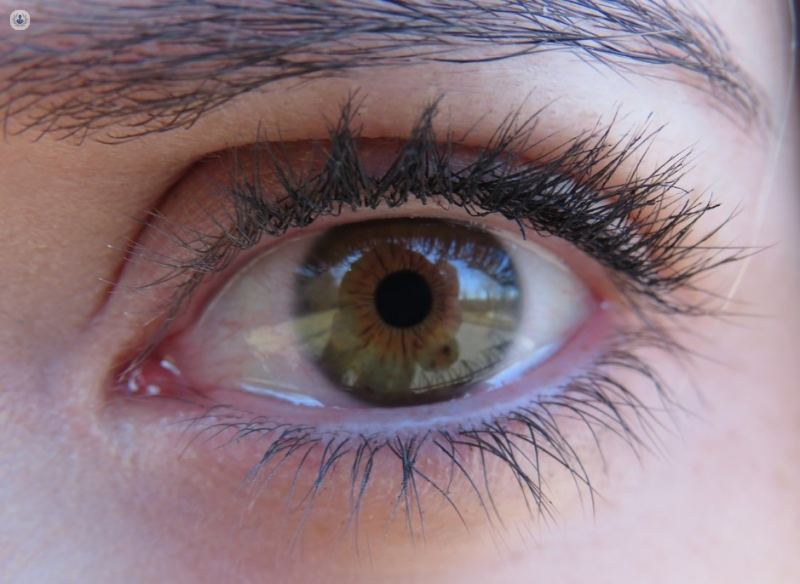An analysis of dry eye syndrome: part 2
Written in association with:Dry eye is a prevalent condition, which provokes irritation and discomfort, interrupting daily life. In the second article of a two-part series, distinguished optometrist Mr Dilesh Makwana discusses the treatment options for dry eye, and explains which home remedies can help to manage dry eye syndrome.

What treatments are available for dry eye, and how do they provide relief?
Several treatments are available for dry eye syndrome, depending on the underlying cause and severity of your condition. Some common treatments include:
Artificial tears
Over-the-counter artificial tear solutions can help lubricate and moisturise your eyes, providing temporary relief from dryness and discomfort.
Prescription eye drops
Your doctor may prescribe medicated eye drops that reduce inflammation, stimulate tear production, or help maintain tear film stability.
Lifestyle changes
Making adjustments such as using a humidifier to add moisture to the air, taking breaks during prolonged screen time, staying hydrated, and avoiding environments with dry or windy conditions can help alleviate dry eye symptoms.
Warm compresses and lid massage
Applying warm compresses to your eyelids and gently massaging them can help open up blocked meibomian glands and improve the quality of your tears.
Punctal plugs
These tiny silicone or collagen plugs are inserted into the tear ducts to block drainage and keep tears on the surface of your eyes longer, increasing moisture and relieving dryness.
Nutritional supplements
Omega-3 fatty acids, found in fish oil supplements, may help improve tear production and reduce inflammation in the eyes.
Prescription medications
In some cases, oral medications such as antibiotics, corticosteroids, or immunosuppressants may be prescribed to alleviate underlying causes of dry eye, such as inflammation or autoimmune disorders.
Specialty treatments
Advanced treatments such as intense pulsed light therapy (IPL), LipiFlow® thermal pulsation, and scleral contact lenses may be recommended for more severe or persistent cases of dry eye.
It is essential to work closely with your optometrist in order to determine the most suitable treatment options for your specific condition and to monitor your progress over time.
Are there lifestyle changes or home remedies for managing dry eye symptoms?
Yes, there are several lifestyle changes and home remedies that can help manage dry eye symptoms and provide relief. It is important to take note of the following advice:
Blinking regularly
You must remind yourself to blink more often, especially when staring at screens or during extended periods of reading or driving.
Use a humidifier
Adding moisture to the air with a humidifier can help prevent dryness, particularly in indoor environments with dry air, such as heated or air-conditioned rooms.
Take breaks from screens
Follow the 20-20-20 rule: Every 20 minutes, take a 20-second break, and look at something 20 feet away to reduce eye strain and promote natural blinking.
Protect your eyes
Wear wraparound sunglasses outdoors to shield your eyes from wind, dust, and ultraviolet (UV) rays, which can exacerbate dry eye symptoms.
Stay hydrated
Drink plenty of water throughout the day to maintain overall hydration, which can help support tear production and prevent dryness.
Position computer screens properly
Position your computer screen slightly below eye level and about 20-28 inches away from your eyes to reduce strain and minimize evaporation of tears.
Avoid air blowers
Avoid direct exposure to air blowers, such as fans, heaters, or air conditioning vents, which can contribute to dryness by increasing evaporation of tears.
Maintain a healthy diet
Consume foods rich in omega-3 fatty acids, such as salmon, flaxseeds, and walnuts, which may help support tear production and reduce inflammation in the eyes.
Stay smoke-free
Avoid smoking and exposure to secondhand smoke, as smoking can worsen dry eye symptoms and contribute to eye irritation and inflammation.
Warm compresses and eye massage
Apply warm compresses to your closed eyelids for a few minutes each day to help stimulate the production of natural oils in your eyelids and improve tear film quality. Gently massaging your eyelids afterward can help distribute these oils across the surface of your eyes.
Incorporating these lifestyle changes and home remedies into your daily routine can help alleviate dry eye symptoms and improve the overall health and comfort of your eyes. However, if symptoms persist or worsen, it is crucial that you consult with your optometrist for further evaluation and treatment.
If you are suffering from dry eye syndrome and would like to book a consultation with Mr Makwana, do not hesitate to do so by visiting his Top Doctors profile today.


